Yet Lord Curzon's life would be accounted by most to
be a failure—certainly by the author of the new biography,* and probably by Lord Curzon himself. Mr. Leonard Mosley, to sus- tain this view of failure, provides us with a series of harrowing pictures of Curzon at the end of his life, racked by pain, effectively deserted by his second wife, still working almost all the time and pouring out a relentless flood of letters, but nursing his old grievances too, blaming Balfour and Baldwin and the King and everyone who he felt had been in any way responsible for his supersession, and alternating between moods of noble resignation and abject self-pity.
Mr. Mosley is an exponent of what can best be
described as the clinical school of biography. • The time has gone by when a statesman can be judged simply by what the people saw of him from the façade he presented to the public. What was going on behind the calm and majestic exterior? When he made his great decisions, how Was he feeling—physically? And what state was he in—mentally and emotionally? It is from this standpoint that this book has been written.
That being so, it is not, I suppose. surprising that Curzon's public and private actions— but particularly the latter--should be subject to examination under a somewhat sharper light than is usual in biography. We are given frequent details of his financial disputes with his daughter Cynthia, who was Sir Oswald Mosley's first wife, of the rapid decline of his relations with his second wife, and of his earlier affair with Elinor Glyn. The account of this last relationship concludes with an extract from a letter which Curzon wrote to his second wife shortly before their marriage, and with Mr. Mosley's comment upon it :
'While you arc away, Gracie. ■oli need have no fear that I shall have thought. wish, fancy, or hope for anyone but you. My life will be one of willing solicitude, with a good deal of hard work, until you come back; and then I shall be Yours, and you mine, and the sun will he shining
*CuRzoN. By Leonard Mosley. fLonginanc, 30s.)
Mosley is in danger of avoiding this fault by an excessively wide margin. He presumably thinks Curzon was a considerable figure as he has chosen to write about him. Yet he shows little respect for his intellect and little liking for his character.
His most characteristic comment on Curzon's
views, actions or behaviour is a rather patronising sneer. And this is sometimes an obfuscating as
well as an unattractive approach. But it does not prevent him telling us a great deal that is new about his subject. The clinical method has some advantages. Mr. Mosley is never dull, and only rarely is he misleading. Despite his bbvious desire to produce a book which makes a good news- paper serial, he rarely wanders far from the facts.
He uses them as a foundation upon which to build a new picture of his subject, but he does not often allow us to see them with the naked eye. Dates are few and far between, and Mr. Mosley often rises grandly above (or quietly by- was the captain of the magnificos' team, though perhaps his best performance in this field is not reported in Mr. Mosley's book. 'It was a ghastly failure,' Curzon 'said when persuaded in the Twenties to try the experiment of a journey on a London bus. 'I mounted the omnibus, told the fellow to take me to Carlton House'Terrace, and he refused.' But I doubt if he took this side of himself too seriously. There was often an element of self-mockery, for which Mr. Mosley makes insufficient allowance, even though he records that Curzon wrote of himself in 1924, 'I look more like a butler than ever, and if I do leave the Government I am sure I can always get myself a good position.'
The central fact about Curzon was that he was an intellectual, convinced throughout his life that it was his duty to use his brain in unremitting competitive toil; and he combined this with a persistent and sometimes abject ambition. It was inconceivable that the country did not need the service of his intellect in posts of the highest importance. It was therefore necessary that he should subordinate his views, his dignity, his personal dislikes in order to serve in any Govern- ment which would have him. Certainly after he ceased to be Viceroy he was always willing to make any accommodation for office. In two respects, therefore, a picture of his standing out as the last bastion of aristocratic politics is distorted. In the first place he was much too clever and intellectually self-conscious to be at all representative of an old order. Lord Derby in his own generation and Lord Hartington in an earlier one were far more typidal. Secondly (as Mr. Mosley is fully aware) he was far too much of a compromiser to be a bastion of anything. He failed in his ultimate ambitions not because he was a peer, or had five houses, or stood for an ArAr Air Air Agr Aar AY Al AP AI AP"














































 Previous page
Previous page